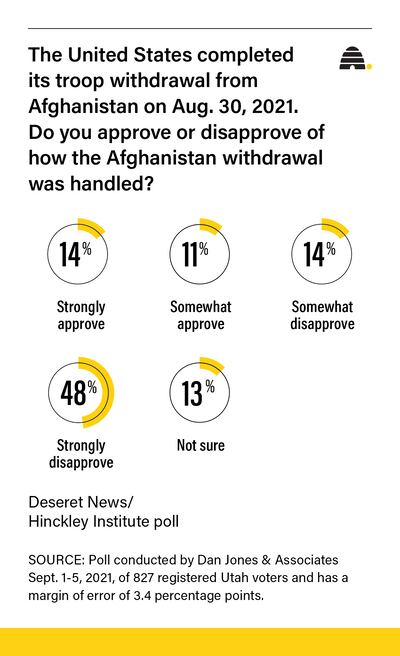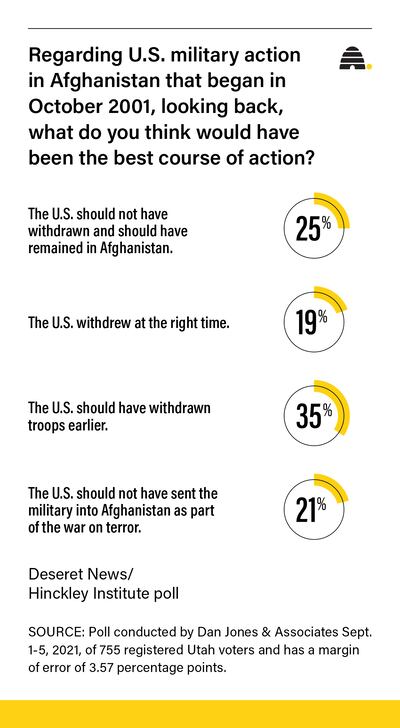A majority of Utah voters have an unfavorable view of the United States’ handling of the withdrawal from Afghanistan, according to a new Deseret News/Hinckley Institute of Politics poll.
Sixty-two percent of Utahns disapprove — including 48% who strongly disapprove — of how the Biden administration handled the end of the 20-year war. Another 25% say they approve, while 13% aren’t sure.
Pollster Dan Jones & Associates surveyed 827 Utah registered voters Sep. 1-5. The poll has a margin of error plus or minus 3.4 percentage points.

The withdrawal has been widely criticized, more recently due to the roughly 100 American citizens who are still stuck in Afghanistan, according to White House chief of staff Ron Klain.
Klain told CNN’s Dana Bash that the Biden administration is working to get Afghan special immigrant visa applicants — a designation given to those who worked alongside U.S. and NATO forces — out of the country. A report from Politico claims the majority of applicants were left behind during the withdrawal, and that many are being targeted by the Taliban.
The chaotic evacuation of Kabul shocked the world as videos emerged of thousands of desperate Afghans rushing the tarmac of Hamid Karzai International Airport, some clinging to the outside of a U.S. Air Force C-17 as it took off.
It’s those scenes that left Utahns with a bad taste in their mouths about the withdrawal, despite the conflict producing 20 years of horrific images and an evacuation that successfully helped over 120,000 people escape the country, said University of Utah political science professor Matthew Burbank.

“Most of what people saw in terms of coverage was long lines at the airport and the horror stories about what was happening in Afghanistan,” Burbank said. “All of that really kind of rolled into a narrative that says, ‘This was American government’s action. This is the president’s decision and so the president is responsible.’”
The survey results point to a partisan divide that permeates national politics in general.
According to the poll, 76% of Republicans say they disapprove — 66% strongly disapprove — of how the Biden administration handled the withdrawal. Opinions are more divided on the Democratic side, with 40% disapproving and 43% approving.
Burbank said that could be due to pure partisanship, Democrats’ disapproval of the war in general, or a tendency to look at the chaotic withdrawal as a symptom of bad policies stemming from Republicans.
“Some think Biden had to do this but it was really Trump’s policy, or others might think the problem started with George Bush and Joe Biden’s just finishing it,” he said. “What you’re getting there is not strong approval of what the president did, but more mixed results.”
Political affiliation appeared to play a role in how Americans viewed the withdrawal early on, with pundits on the right like Tucker Carlson and Ben Shapiro blasting the Biden administration, while left-wing commentators Rachel Maddow and Chris Hayes applauded the president for doing what, in Maddow’s words, his recent predecessors would not.

If not now, when?
There is slightly less consensus among Utah voters on when U.S. and allied forces should have left Afghanistan, according to the poll.
Utahns leaned toward pulling American troops out before 2021, with 35% favoring an earlier withdrawal date. However, 25% said the U.S. should have remained in Afghanistan past Aug. 31, and 21% said American troops should have never set foot in the country. Another 19% said the U.S. withdrew at the right time.
Jones surveyed 755 Utah registered voters on that question. It has a margin of error of plus or minus 3.57 percentage points.
The U.S. mission in Afghanistan was an ever-evolving one, said David Schwendiman, adjunct professor at the U.’s S.J. Quinney College of Law, who spent five years in Afghanistan with the Department of Justice.
“We went there with a purpose, we spent money for a purpose, the purpose kept changing and kept being redefined from 2001 when we first went to 2021 when we left,” Schwendiman said during a recent roundtable discussion at the U. “When I went, the first time in 2010 ... our purpose had changed considerably, even from 2006.”
Two decades of involvement without clarity eventually resulted in a public that was confused and divided on what the point of the war was, and whether the U.S. should or shouldn’t withdraw, Burbank said.
“That ... captures in a way, the essence of American public opinion about Afghanistan,” he said. “There is no overall sense that there’s an absolutely clear strategy we should be following.”
Partisanship appears to play a role in whether Utahns think the U.S. should have ever been involved in Afghanistan, too.
The poll found 14% of Republicans think the U.S. should have stayed out of Afghanistan compared to 30% of Democrats. When asked whether U.S. troops should have remained in the country past Aug. 31, the results swing the other way, almost identically.
“This has been a difficult issue at different times for both Democrats and Republicans. We’ve had this policy pursued by both Democratic and Republican presidents,” Burbank said. “Both parties to some extent are a part of this. They can’t do what they often do, which is to say ‘this is the other party’s fault.’”

Parallels to Vietnam
Because many who served in Vietnam were drafted into the military, experts like Schwendiman say the anti-war backlash from the Afghanistan withdrawal won’t be as severe.
“Culturally, domestically, I just don’t see the impact the same as Vietnam. There are other factors in our culture now that are impacting that much more seriously and much more severely than the two conflicts in Afghanistan and Iraq,” he said.
But Schwendiman does think that a reduction in the number of Americans enlisted in the military, similar to what happened with the U.S. after the Vietnam conflict, is likely, as the demand simply won’t be there.
Burbank said the public was divided after the withdrawal from Vietnam because, much like Afghanistan, the conflict was carried out under multiple presidents and political parties.
If anything, he said, the American public will likely demand a clear exit strategy in any future war.
“I think the sharpest question for American public opinion is, how do we get out of this. How do we not have a disaster when we leave,” he said. “Hopefully Americans pick up that point that if we’re going to be involved militarily in other countries, we have to think seriously about what the endgame looks like.”



